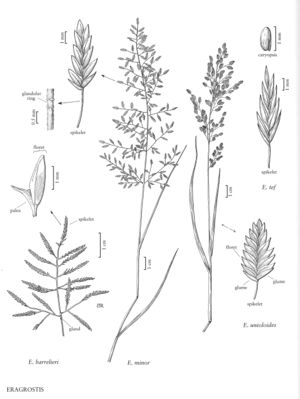Eragrostis minor
Plants annual; tufted, without innovations. Culms 10-45 cm, erect to decumbent, sometimes with a ring of glandular tissue below the nodes. Sheaths sometimes glandular on the midveins, hairy at the apices, hairs to 4 mm; ligules 0.2-0.5 mm, ciliate; blades 1.5-10 cm long, 1-3(4) mm wide, flat, glabrous or sparsely white-hairy, margins sometimes with crateriform glands. Panicles 4-20 cm long, 2.2-8(10) cm wide, ovate, open to contracted, rachises sometimes with glandular spots or pits below the nodes, rarely with a glandular ring, glands usually dull, greenish-gray to stramineous; primary branches 0.5-6 cm, diverging 20-100° from the rachises; pulvini glabrous or hairy; pedicels 1-4 mm, stiff, straight, divergent, usually with a distal ring of crateriform glands. Spikelets 4-7(11) mm long, 1.1-2.2 mm wide, narrowly ovate, mostly reddish-purple to greenish, occasionally grayish, with 7-12(20) florets; disarticulation acropetal, paleas persistent. Glumes broadly ovate, membranous; lower glumes 0.9-1.4 mm; upper glumes 1.2-1.6 mm; lemmas 1.4-1.8 mm, broadly ovate, membranous, keels occasionally with 1-2 crateriform glands, apices acute to obtuse; paleas 1.3-1.7 mm, hyaline, keels smooth or scabridulous, scabridities to 0.1 mm, apices obtuse to acute; anthers 2, 0.2-0.3 mm, reddish-brown. Caryopses 0.4-0.7 mm, ellipsoid, not grooved, striate, light brown. 2n = 40.
Distribution
Wash., Del., D.C., Wis., W.Va., Conn., Mass., Maine, N.H., R.I., Vt., Fla., Wyo., N.J., Tex., La., Nebr., Tenn., N.C., S.C., Pa., N.Y., Nev., Va., Colo., Md., Calif., Ala., Ark., Ill., Ga., Ind., Iowa, B.C., N.B., N.S., Ont., P.E.I., Que., Sask., Idaho, Mont., Oreg., Kans., Okla., Ohio, Utah, Mo., Minn., Mich., Miss., Ky., S.Dak.
Discussion
Eragrostis minor is a European species that now grows in gravelly roadsides and disturbed sites, especially near railroad yards, at 20-1600 m in southern Canada and the contiguous United States.
Selected References
None.
